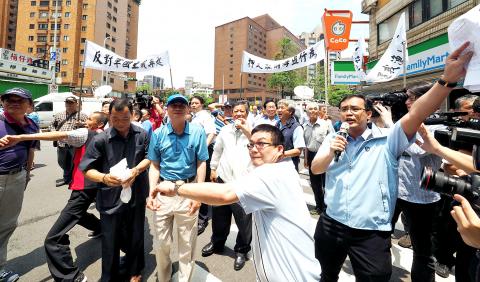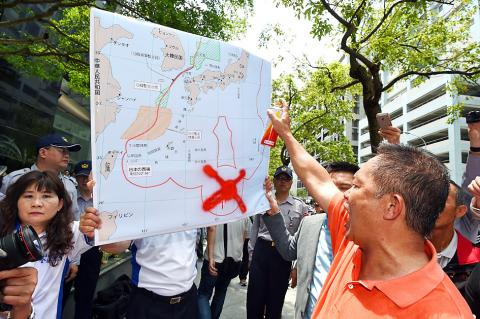President Ma Ying-jeou (馬英九) yesterday vowed to safeguard the fishing rights of Taiwanese fishermen in international waters and denied Japan’s claim that the Okinotori atoll is an island.
The Presidential Office issued a statement saying that Ma made the pledge during a high-level national security meeting attended by Vice President Wu Den-yih (吳敦義), Premier Simon Chang (張善政) and top officials from the ministries of foreign affairs and national defense, the Coast Guard Administration and the Council of Agriculture.
The meeting was called to discuss countermeasures to the Japan Coast Guard’s confiscation of the Taiwanese fishing boat, Tung Sheng Chi No. 16, about 150 nautical miles (277.8km) east-southeast of the Okinotori atoll on Monday and its demand for a ¥6 million (US$54,240) “security deposit,” the office said.

Photo: David Chang, EPA
The boat was released, along with its Taiwanese captain and nine Chinese and Indonesian crew members, on Tuesday afternoon after its owner, Pan Chung-chiu (潘忠秋) — the father of its captain, met Tokyo’s demand.
During the meeting, Ma announced the government’s three-part stance on the incident, the office said.
First, based on Article 121 of the UN Convention on the Law of the Sea (UNCLOS), the Okinotori atoll, which has a total area of less than 3 ping (9.9m2), is not an island that can “sustain human habitation or economic life of their own.”

Photo: Chien Jung-fong, Taipei Times
“Thus, Japan cannot claim a 200 nautical mile exclusive economic zone [EEZ] around the outcroppings. We will also firmly defend our fishermen’s freedom to operate in the high seas,” the office quoted Ma as saying.
Second, the government is opposed to and does not recognize Japan’s illegal expansion of rights by unilaterally defining the uninhabited rock as an “island,” Ma said, adding that Japan’s seizure of Taiwanese fishermen operating in international waters infringed on their freedom of fishing conferred by Subparagraph 5, Paragraph 1, Article 87 of the UNCLOS.
Third, the government would step up efforts to protect the nation’s fishermen operating near the atoll and safeguard their rights.
The office said Ma also instructed the Executive Yuan to adopt three measures, including a request that all levels of government agencies refer to the atoll as “Okinotori rock” rather than “Okinotori Island.”
The Executive Yuan was also asked to have the foreign ministry and the Taipei Economic and Cultural Representative Office in Japan to continue negotiations with their Japanese counterparts, while asking the Coast Guard Administration and the Fisheries Agency to put forward concrete measures to protect the nation’s fishermen and carry them out immediately.
About 300 fishermen, mobilized by the National Fishermen’s Association, rallied at noon yesterday outside the Taipei office of the Interchange Association, Japan, with some spraying paint on a map of the Okinotori reefs in protest.
The protest was led by association head Huang Yi-cheng (黃一成) and Pan, while several lawmakers, including Chinese Nationalist Party (KMT) Legislator Huang Chao-shun (黃昭順) and Democratic Progressive Party Legislator Chuang Jui-hsiung (莊瑞雄), showed up to lend support.
Holding banners and yelling slogans, the fishermen demanded that the Japanese government apologize and that “justice be served” for the seizure of the vessel. They also condemned what they said was Japan’s rude and unreasonable conduct.
The Okinotori reefs are not islands and therefore not entitled to an exclusive economic zone, and Taiwanese fishermen’s rights to operate in international waters must be protected, the protesters said.
Despite the good relationship between Taiwan and Japan, the official from the Japanese representative office was rude in accepting the fishermen’s petition, they said.
Huang said the Japanese official took the letter and turned away without offering an apology, while Chuang said he was also dissatisfied with the envoy’s attitude.

AGING: As of last month, people aged 65 or older accounted for 20.06 percent of the total population and the number of couples who got married fell by 18,685 from 2024 Taiwan has surpassed South Korea as the country least willing to have children, with an annual crude birthrate of 4.62 per 1,000 people, Ministry of the Interior data showed yesterday. The nation was previously ranked the second-lowest country in terms of total fertility rate, or the average number of children a woman has in her lifetime. However, South Korea’s fertility rate began to recover from 2023, with total fertility rate rising from 0.72 and estimated to reach 0.82 to 0.85 by last year, and the crude birthrate projected at 6.7 per 1,000 people. Japan’s crude birthrate was projected to fall below six,

US President Donald Trump in an interview with the New York Times published on Thursday said that “it’s up to” Chinese President Xi Jinping (習近平) what China does on Taiwan, but that he would be “very unhappy” with a change in the “status quo.” “He [Xi] considers it to be a part of China, and that’s up to him what he’s going to be doing, but I’ve expressed to him that I would be very unhappy if he did that, and I don’t think he’ll do that. I hope he doesn’t do that,” Trump said. Trump made the comments in the context

SELF-DEFENSE: Tokyo has accelerated its spending goal and its defense minister said the nation needs to discuss whether it should develop nuclear-powered submarines China is ramping up objections to what it sees as Japan’s desire to acquire nuclear weapons, despite Tokyo’s longstanding renunciation of such arms, deepening another fissure in the two neighbors’ increasingly tense ties. In what appears to be a concerted effort, China’s foreign and defense ministries issued statements on Thursday condemning alleged remilitarism efforts by Tokyo. The remarks came as two of the country’s top think tanks jointly issued a 29-page report framing actions by “right-wing forces” in Japan as posing a “serious threat” to world peace. While that report did not define “right-wing forces,” the Chinese Ministry of Foreign Affairs was

PREPAREDNESS: Given the difficulty of importing ammunition during wartime, the Ministry of National Defense said it would prioritize ‘coproduction’ partnerships A newly formed unit of the Marine Corps tasked with land-based security operations has recently replaced its aging, domestically produced rifles with more advanced, US-made M4A1 rifles, a source said yesterday. The unnamed source familiar with the matter said the First Security Battalion of the Marine Corps’ Air Defense and Base Guard Group has replaced its older T65K2 rifles, which have been in service since the late 1980s, with the newly received M4A1s. The source did not say exactly when the upgrade took place or how many M4A1s were issued to the battalion. The confirmation came after Chinese-language media reported